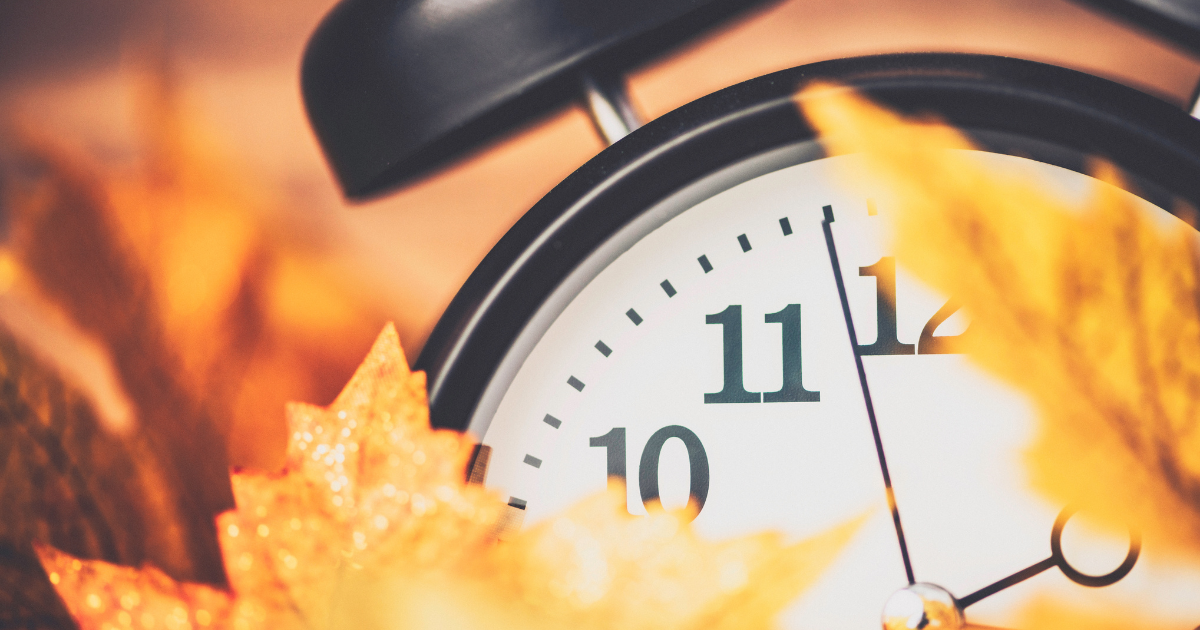Turning the clocks back an hour in the fall provides everyone with an additional hour of sleep. Statistically speaking, there is less impact on driving ability during the end of daylight saving time (DST) than spring forward. However, earlier nightfall does present some unique driving challenges as well.
Just like the spring forward puts the majority of morning commuters in the dark, the fall back plunges some commuters into the dark earlier as well. Though it may sound odd, even fall and winter attire can make it more difficult to see pedestrians and cyclists, as clothing colors during these months are typically darker than those worn in spring and summer.
Losing an hour of daylight forces more drivers to be on the road during the night. According to the National Safety Council, car accident fatalities are three times more likely to happen at night. The majority of decisions drivers make is based on what they see, and limited light makes that much more difficult.
Furthermore, dusk is one of the most dangerous times of day to drive, as the sky is often still light, but the roads become dark. This imbalance can dramatically affect your ability to see clearly. Exercising the following tips can help increase visibility during nighttime hours.
Clean the Windows
Make sure all of your car’s windows are clean and intact, especially the windshield. Dirty or broken windows scatter light, increase glare from streetlights and oncoming cars, and can even cause dangerous temporary blindness.
Check the Lights
Test all of your vehicle’s lights to make sure they are clean and functioning properly. This includes the inside lights as well. Dashboard lights set too high can impair your eyes’ ability to adjust between looking at the dash and looking at the road. Lowering the interior lights will help reduce inside glare as well.
Direct the Headlights
Check the direction of your headlights. Pointing downward reduces your ability to see the road clearly, and pointing upward can be blinding to other drivers. You will need to take your car to a mechanic if they need adjusting. Also, use your car’s high-beams when you are able, and lower them when approaching oncoming traffic.
Avoid Other Cars’ Headlights
Nighttime driving can be challenging for many people, especially when it comes to other cars’ headlights. Staring into an oncoming car’s headlights can cause temporary blindness or the “star effect” to your vision, which could easily cause you to drive out of your lane.
When approaching oncoming traffic, shift your gaze to the white line on the right side of the road. You can still see ahead of you, and following the white traffic marking will also keep you in your lane.
Stick to Bigger Roads
If possible, travel on larger roads, such as interstates and freeways. Two-lane roads have much fewer lights and can cause increased glare, and they are often curvier than freeways and interstates.
Reduce Speed
Even if you are familiar and experienced driving your evening commute, the sudden change from daylight to nighttime can throw off your perception and affect your vision. A large percentage of driving fatalities happen at night due to lower visibility and less reaction time.
Avoid Happy Hour
Many people go out to eat or gather with coworkers for a cocktail after work. While drinking and driving is never a good idea, adding alcohol to your already fatigued system due to the end of DST may cause a quicker and stronger reaction, and you may become impaired faster.
In addition, the end of DST has a direct effect on your circadian rhythm. Though the move is only an hour, it can be a big disruption to your sleep pattern. Light and dark signal your circadian rhythm to wake or sleep, and evening commutes that will now be during darkness trigger drowsiness and sleep, and this could linger awhile. Adjusting to the time change generally takes about a week for most people.
How Can I Avoid DST-Related Drowsy Driving?
According to the National Highway Traffic Safety Administration (NHTSA), drowsy driving is just as dangerous as drunk driving and accounts for about 100,000 accidents per year. Taking a proactive approach to the time change is a good, responsible, and beneficial practice. Despite the physical and mental effect of gaining an hour of sleep, there are steps you can take to avoid a DST-related car accident.
Go to Bed Earlier
Go to bed earlier at night or sleep in a little later in the morning. Starting this several days or a week before the actual time change will result in much less disruption of your internal clock and prevent you from driving in a fatigued state.
Carpool
Carpool to work or travel with someone going to the same general area. Having another person in the car can help with your alertness, as conversation keeps you engaged and focused. Also, if you are too drowsy to drive, your travel companion can take the wheel instead.
Reduce Speed
Change the way you drive by reducing your speed, allowing more distance between you and other vehicles. Reducing speed will also help you pay more attention to your surroundings and the driving of other motorists.
Take a Break
Take a break, and pull over if you are experiencing symptoms of drowsy driving. Some symptoms of drowsy driving include the feeling of your eyes getting heavy, yawning, running off the side of the road, or and when you cannot remember the last few minutes of driving.
Avoid Driving Altogether
If possible, avoid driving altogether for a week or two, and utilize public transportation instead. Most towns and cities have at least one form of public transportation, such as trains, a bus, metro systems, and the like. Depending on the length of your commute, public transportation may also allow you to sneak in a nap during the ride.
Prepare Ahead of Time
You can start preparing yourself for the time change even before the clocks fall back. Starting a week or two ahead, go to bed earlier, giving yourself another hour or two of sleep each night.
In addition to getting the extra hour of sleep, the daylight will remain the same during your morning and evening commute, easing the adjustment. So, gradually adjusting yourself to the change before DST ends will help your internal clock.
What if I am in an Accident After the Time Change?
Car accidents can elevate during the time change, largely due to drowsy driving. Many accidents involving a sleep deprived motorist can also result in serious or fatal injuries, including broken or amputated limbs, internal organ damage, spinal cord and brain injuries, and burns, among others.
Damages caused by fatigued drivers can result in permanent impairment, disabilities and pain, reducing your quality of life and potentially your ability to provide for yourself and your family. For these reasons, it is important to seek legal guidance after a serious car accident.
Virginia Beach Car Accident Lawyers Advocate for Those Injured by Drowsy Drivers
The end of DST can affect all drivers. If you have been injured by a fatigued driver, our Virginia Beach car accident lawyers can help. At East Coast Trial Lawyers, we can help you hold the negligent motorist accountable for their actions. Call us at 757-352-2237 or contact us online for a free consultation. Located in Virginia Beach, we serve clients throughout Chesapeake, Eastern Shore, Hampton, Newport News, Norfolk, Portsmouth, and Suffolk, Virginia, as well as North Carolina and nationwide.


